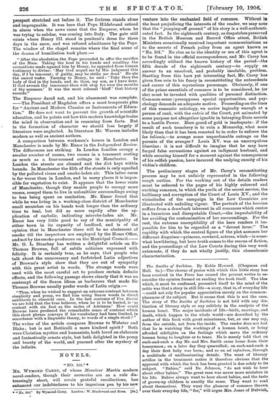Mn. WYMOND CABBY, of whose Monsieur Martin modern novel-readers, though
their memories are as a rule dis- tressingly short, will retain grateful recollections, has enhanced our indebtedness to his ingenious pen by his new • "No. 101." By Wyniond Carey. London: W. Blackwood and Sons, [6..] venture into the enchanted field of romance. Without in the least prejudicing the interests Of the reader, we 'may note that the " jumping-off ground" of his story is a well-authenti- cated fact. In the eighteenth century, as despatches preseiwed in the British Museum and Record Office attest, British Ministers occasionally received .important communiCations as to the secrets of French policy from an agent known . as "No. 101." No clue as to the identity or sex of this agent is to be 'found in the official correspondence, and Mr. Carey has accordingly utilised the known history of the periodthe fifth decade of the eighteenth century—to supply an answer to an unsolved, and probably insoluble, .problem. Starting from this bare yet interesting fact, Mr. Carey has given free rein to his fancy in reconstituting the antecedents and career of this mysterious personage. Obviously, if one of the prime essentials of romance -is to be considered, he (or she) must be invested with qualities of personal distinction: Common-sense I presupposes special opportunities, and pay- chology demands an adequate motive. Proceeding onthelines of this romantic aetiology, we arrive logically enough at a person of rank, with the entree of the Court, yet animated by some purpose not altogether ignoble in betraying State secrets to a hostile Power. Mere greed of gold is inadequate : if' the result of such treachery is to ruin a Monarchy, what more likely than that it has been resorted to in order to enforce the len talionis,—to avenge some unpardonable outrage on the parents of the avenger P Louis XV. was an unscrupulous libertine : it is not difficult to imagine that he may have forged false accusations against an indignant husband, and while securing himself for a moment against the consequencei of his selfish passion, have incurred the undying enmity of his victim's children.
The preliminary stages of Mr. Carey's reconstituting process may he not unfairly represented in the following rough outline. For the working• out of the details readers must be referred to the pages of his highly coloured and exciting romance, in which the perils of the secret service, the brilliancy and corruption of the Court of Louis XV., and the vicissitudes of the campaign in the Low Countries are illustrated with unfailing vigour. The portrait of the heroine suffers from a drawback inherent inall romances which centre in a luxurious and disreputable Court,—the improbability of her avoiding the contamination of her surroundings. For the rest, the extreme susceptibility of the hero renders it jai, possible for him to be regarded as a "devout lover." The rapidity with which .the central figure of the plot, assumes her different disguises—princess, cowherd, actress, witch—is some- what bewildering, but here truth comes to the rescue of fiction, and the proceedings of the Law Courts during this very week extenuate, if they do not wholly justify, this chameleonio characterisation.










































 Previous page
Previous page